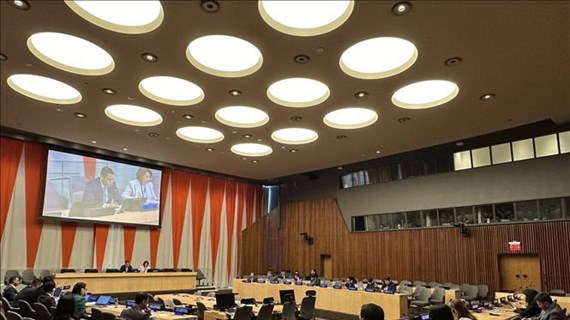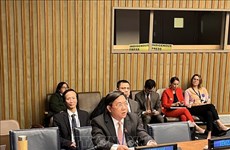Vietnam has good track record against sex selection: UNFPA
 Delegates pose for a group photo. (Source: VNA)
Delegates pose for a group photo. (Source: VNA)Addressing the “South-South Consultation Workshop on Addressing Son Preference, Undervaluing of Girls, and Gender-Biased Sex Selections”, organised in Hanoi by UNFPA Asia and the Pacific, Andersson described the country's track record on the work as "very good", adding that many good practices have emerged.
The official cited those in the area of policy and legislative reform like the impact of the Law on Population and the Law on Social Insurance and innovative programmes like the fatherhood programme which puts Vietnam as a model good practice country for the purposes of south-south collaboration.
Today, around 140 million women are believed to be
“missing” around the world, as a result of son preference and gender-biased sex
selection, which is a pervasive form of gender inequality and discrimination,
according to Andersson.
The rise in sex selection is alarming as it reflects
the persistent low status and devaluing of women and girls, he stressed.
It is in this context that UNFPA is calling for
renewed attention to the issue and accelerating efforts to develop policies,
the data and evidence base and undertake programming that end all forms of gender-based
discrimination, including son preference and gender-biased sex selection, Andersson
noted.
The workshop brought together representatives of
government agencies and experts from Armenia, Azerbaijan, China, Bangladesh,
India, Nepal, and Georgia, who shared experience in this regard in their
respective countries.
It also looked into the Global Programme on Addressing
Gender-Biased Sex Selection (GBSS) in Asia 2020-2022 funded by the Government
of Norway (NORAD), with a special focus on Bangladesh, Nepal, and Vietnam.
The programme aims to build on and strengthen
evidence-based national policies and programmes to address son preference, the
low value of girls and gender inequalities resulting in the GBSS.
 Illustrative image (Source: VNA)
Illustrative image (Source: VNA)In Vietnam, the programme backs ongoing government
efforts to fully implement legal and policy frameworks to end the phenomenon.
This includes improving the country’s knowledge base
on sex ratio at birth (SRB); innovative campaigning to change social norms and
practices that reinforce son preference and the low value of girls; strengthening
the capacities of the media, implementing a fatherhood programme, and developing
multi-stakeholder coordination mechanisms for addressing the GBSS.
The long-standing son preference in Vietnam is
believed to be the main root cause of the sex imbalance at birth.
According to Vietnam’s 2019 Census, the probability of
having a second child is higher for couples with a daughter than those with a
son (79.6% and 76%).
The latest sex ratio at birth in the country's 63 cities and provinces
ranges from 109 to 219 boys per 100 girls. In some northern provinces, the
number of boys is twice that of girls.
It is forecast that if the SRB stays at the
present level, the excess of males aged 15-49 will be 1.5 million by 2034, and
2.5 million by 2059./.













